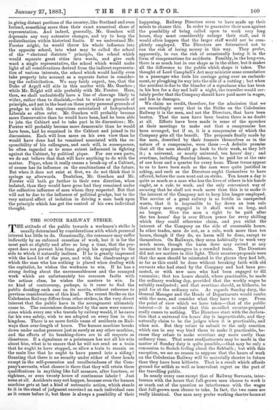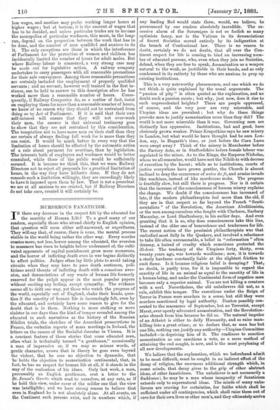THE SCOTCH RAILWAY STRIKE.
THE attitude of the public towards a workmen's strike is usually determined by considerations with which personal interest has little to do. Occasionally, the consumer may suffer indirectly by an enforced cessation of work, but it is for the most part so slightly and after so long a time, that the pro- spect does not prevent him from giving his sympathy to the side to which it naturally inclines. If he is greatly impressed with the hard lot of the poor, and with the disadvantage at which the man who has nothing is placed when dealing with the capitalist, he wishes the workmen to win. If he has a strong feeling about the unreasonableness and the scamped work which are unfortunately too common faults with the artizan class, he wishes the masters to win. In no kind of controversy, perhaps, is it rarer to find the public deciding each case on its merits, without reference to previous considerations of this kind. The recent Strike on the Caledonian Railway differs from other strikes, in the very direct interest that the public have in the arrangement ultimately come to. The concessions demanded by the men were conces- sions which every one who travels by railway would, if he cares for his own safety, wish to see adopted on every line in the kingdom. There is no more fertile cause of accidents on Rail- ways than over-length of hours. The human machine breaks down under undue pressure just as surely as any other machine, and the effects of its breaking-down are in all respects as disastrous. _ If a signalman or a pointsman has not all his wits about him, what is to ensure that he will not send on a train that he ought _to_have stopped, or allow a train to remain on the main line that he ought to have passed into a siding? Granting that there is no security under either of these heads except in the self-possession and recollectedness of the Com- pany's serve/its, what chance is there that they will retain these qualifications in anything like full measure, after fourteen, or eighteen or even twenty hours of continuous labour? Just none at all. Accidents may not happen, because even the human machine gets at last a kind of automatic action, which stands to it in the stead of judgment exercised on each individual case as it comes before it, but there is always a possibility of their
happening. Railway Directors seem to have made up their minds to chance this. In order to guarantee their men against the possibility of being called upon to work very long hours, they must considerably enlarge their staff, and it would often happen that the larger staff would not be com- pletely employed. The Directors are determined not to run the risk of losing money in this way. They prefer, apparently, to run the risk of occasionally losing it in the form of compensations for accidents. Possibly, in the long-run, there is as much lost in one shape as in the other, but it makes all the difference to the public which shape it takes. The thought of Lord Campbell's Act may minister some consolation to a passenger who feels his carriage going over an embank- ment, or ploughing its way into the side of a cutting ; but when the accident is due to the blunder of a signalman who has been in his box for a day and half a night, the traveller would cer- tainly prefer that the Company should have paid more in wages, and less in damages.
We claim no credit, therefore, for the admission that we are exceedingly sorry that in the Strike on the Caledonian Railway it is the men, and not the Directors, that have been beaten. That the men have been beaten there is no doubt at all. Efforts have been made in some of the speeches at their meetings to make out that a compromise has been arranged, but if so, it is a compromise of which the Company gets all the benefit. The proposals finally made by the men, described by their framers themselves as in the nature of a compromise, were three :—A definite promise that all the men should go back to their work, as they left it ; a universal, or nearly universal, ten hours' day ; and overtime, including Sunday labour, to be paid for at the rate of one hour and a quarter for every hour. These terms appear to us to have been such as the men were quite justified in asking, and such as the Directors ought themselves to have offered, before the men went out on strike. Ten hours a day is quite as much as a man who has the lives of others in his hands ought, as a rule, to work, and the only convenient way of securing that he shall not work more than this is to make it, the interest of the Company not to keep him longer employed. The service of a great railway is so fertile in unexpected wants, that it is impossible to lay down an iron rule that every man engaged in it shall work so long, and no longer. Give the men a right to be paid after the ten hours' day is over fifteen pence for every shilling which they could otherwise claim, and you enlist the interest of the Company on the side of reasonable hours. In other trades, men do not, as a rule, work more than ten' hours, though if they do, no harm will be done, except to themselves. On Railways, they seem habitually to work very much more though the harm done may extend at any moment to ;he passengers in a crowded train. The Directors did not see matters in this light. Their counter-proposals were that the men should be reinstated in the places they had left,
so far as this could be done without breaking faith with old servants who had stood by the Company and had been pro-
moted, or with new men who had been engaged to fill. vacancies ; that ten hours should, where practicable, be made_ the ordinary working day, provided that the weekly wages be suitably readjusted ; and that overtime should, as hitherto, be paid for at the ordinary rate. As regards Sunday duty, the General Manager and the Heads of Departments would confer, with the men, and consider what they have to urge. From. the point of view which we have taken—that of the public. interest—it is evident that this so-called counter-proposal really comes to nothing. The Directors start with the declara- tion that a universal ten hours' day is impracticable, and they naturally claim to be the judges when it is practicable, ancl when not. But they refuse to submit to the only sanction which can in any way bind them to make it practicable, be- cause they refuse to make overtime any more costly than ordinary time. That some readjustments may be made in the matter of Sunday duty is quite possible,—that may be only a concession to Scotch feeling about the Sabbath ; but with this exception, we see no reason to suppose that the hours of work on the Caledonian Railway will be materially shorter in future than they have been hitherto. That is a result which affords ground for selfish as well as benevolent regret on the part of the travelling public.
In nearly every case except that of Railway Servants, inter- ference with the hours that full-grown men choose to work is as much out of the question as interference with the wages that full-grown men choose to take. In fact, the two eases are really identical. One man may prefer working shorter hours at less wages, and another may prefer working longer hours at higher wages ; but at bottom, it is the amount of wages that has to be decided, and unless particular trades are to become the monopolies of particular workmen, this must, in the long. run, depend on the proportion between the work that has to be done, and the number of men qualified and anxious to do it. The only exceptions are those in which the interference of Parliament for the protection of women and children has incidentally limited the number of hours for adult males. But where Railway labour is concerned, a very strong case may be made out for legislative action. A railway company undertakes to carry passengers with all reasonable precautions for their safe conveyance. Among these reasonable precautions are certainly included the employment of properly qualified servants ; and no servant, however well trained in the first in- stance, can be held to answer to this description after he has worked more than a reasonable number of hours. Conse- quently, if Railway Companies do, as a matter of fact, insist en employing them for more than a reasonable number of hours, we know of no reason why they should not be restrained from doing so by Act of Parliament. If it is said that their own self-interest will ensure that they will not over-work their men, the answer is that universal testimony goes to show that they are not restrained by this consideration. The temptation not to have more men on their staff than they are certain of always finding full work for is more than they can resist. It would be much better in every way that the limitation of hours should be effected by the automatic action of a rule about payment for overtime, than by legislation. The interests both of employers and workmen would be better consulted, while those of the public would be sufficiently secured. It is because we think this, that we warn Railway Directors not to reject all proposals for a practical limitation of hours, in the way they have hitherto done. If they do not concede such a limitation willingly, they are exceedingly likely to have it imposed upon them by law. That is not a precedent we are at all anxious to see created, but if Railway Directors do not take care, created it will certainly be.







































 Previous page
Previous page